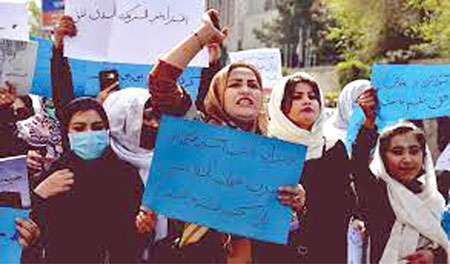Civil society groups, political parties and ethnic councils on Thursday in Kabul at a press conference called for the reopening of all girls’ schools in the country.
In reaction to the closing of girls ‘schools above the sixth grade, the participants at the conference urged the Islamic Emirate to explain to the people the main reason for the closing of girls’ schools.
In a resolution, they called on the Islamic Emirate to reopen girls’ schools in the country as soon as possible.
“What kind of problem is this that has taken the fate of Afghan girls hostage? What special measures are we waiting for? Why is the main issue not shared with the people and the people are kept in the dark?” said Momand Mohammadi, a civil activist.
“We very respectfully request that the schools be opened to our students as soon as possible and that no more time be wasted,” said Abeda Majdi, a religious scholar.
Some of the teachers and students who attended the conference said that girls’ right to education should not be politicized.
They asked the international community to pay serious attention to the education of Afghan girls.
“The exclusion of women from society and the banning of girls from school is a clear act of oppression. Please do not politicize education, we want our rights, we want education,” said Munawara Qureshi, a student.
Participants added that there is no Islamic, national or cultural justification for keeping girls away from education.
“I call on the leadership of the Islamic Emirate to please allow girls and sisters above the sixth grade to study at the bachelor’s, master’s and doctoral levels,” said Shir Alam, a tribal elder.
Previously, US Special Representative for Afghanistan Thomas West also called on the Islamic Emirate to heed the demands of religious scholars and elders across the country and lift restrictions on girls’ education.
Three sources familiar with the matter told Reuters that the series of meeting between U.S. and Islamic Emirate administration officials were set to take place on the sidelines of a summit in Qatar’s capital on Saturday and Sunday.
Some of the meetings were to have included United Nations and World Bank representatives, the sources added.
An Afghan foreign ministry spokesman confirmed that a delegation of the Islamic Emirate, including the acting foreign minister, had been expecting to go to Doha.
The talks were designed to cover issues including the independence of the Afghan central bank and the printing of Afghani currency bank notes.
Also up for discussion were a humanitarian exchange facility to free up cash and hundreds of millions of dollars of funding currently held in a World Bank Trust Fund that is earmarked for Afghanistan’s education sector, according to the three sources.
They declined to be named because they were not authorised to speak with the media.
“The Qatari jet that was meant to collect Muttaqi’s delegation in Kabul has not turned up,” said a diplomatic source, referring to Acting Foreign Minister Amir Khan Muttaqi.
Qatar’s foreign ministry did not immediately respond to a request for comment.
The move shows the headwinds the Islamic Emirate administration faces in accessing foreign aid and freeing up the banking sector, which faces hard currency shortages that have fuelled inflation and worsened the economic crisis.
The Islamic Emirate have also been unable to access billions of dollars in foreign reserves held overseas as governments including the United States refuse to fully recognise them.
Washington and its allies have insisted that the Islamic Emirate, which banned girls from school and most women from work the last time it ruled, improves its human rights record.
The Islamic Emirate on Wednesday backtracked on their previous commitment to open high schools to girls, saying that they would remain closed until a plan was drawn up for them to reopen.










